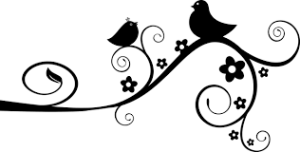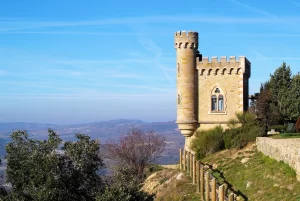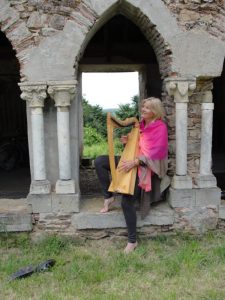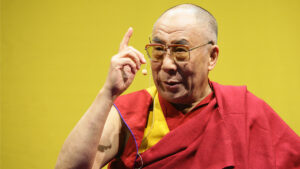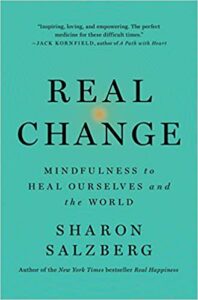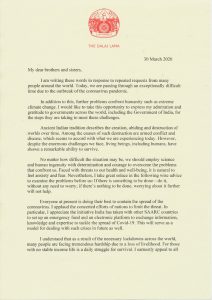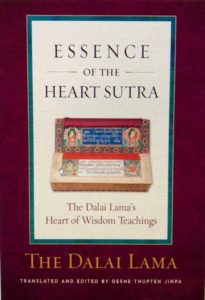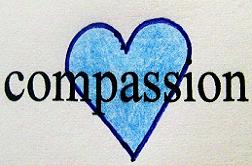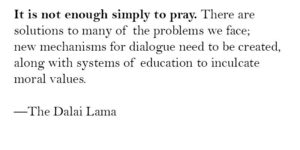Dalai Lama
Dayle in Limoux – Day #62
September 5, 2022Reading today about the influences of Saint-Catherine of Alexandria, beloved of the Beguines and Joan of Arc’s spiritual voice and influence. She was 22 when she was tortured and murdered because she refused to marry an Egyptian emperor. She was killed in the year 305.
Britannica: She protested the persecution of Christians under the Roman emperor Maxentius—whose wife and several soldiers she converted while imprisoned—and defeated the most eminent scholars summoned by Maxentius to oppose her. During her subsequent torture, she professed that she had consecrated her virginity to Jesus Christ, her spouse, and was sentenced to death. The spiked wheel by which she was to be killed broke when she touched it (whence the term Catherine wheel), and she was then beheaded.
The wheel was a horrific way to die a slow, excruciating death. This is why we often see Catherine depicted with a wheel.
From the book, The Wisdom of the Beguines/The Forgotten Story of a Medieval Women’s Movement, by Laura Swan,
The Beguines chose four women who they felt had proclaimed the gospel for their lives: the apostle Mary Magdalene, the martyrs Saint Catherine of Alexandria, and Saint Agnes, and the abbess of Andenne, Begga. You smile with delight (p. 50).
Beguines were a powerful expression of the vita apostolic, being ‘apostolic life’ or ‘the life of an apostle.’ They pooled their resources in order to serve the sick and destitute by building and operating infirmaries and almshouses (p. 17, 19). Many beguines used their sources of income to purchase homes near the chapel or parish church where they gathered together for prayer (p. 15).
Many women became beguines as a result of their newfound literacy (p. 21). Beguinages endured the ravages of war and plague, hostile politics and shifting cultural attitudes […] some managed to survive all the way into the twentieth century (67). Beguines were not nuns (p. 13). Nuns were steady supporters of the beguines (p.15).
Some of the beguines were considered ‘heretics,’ of course. When men didn’t agree with women’s motives or rhetoric, they were ‘heretics.’ One beguines, Marguerite Porete, a larned beguines preacher and writer, was sentenced by the Inquisition to be burned at the stake. She was a learned beguine preacher and writer, and was murdered on June 1, 1310. Her crime? Her work of mystical theology called, ‘The Mirror of Simple Souls,’ which she had composed in Old French and shared with others.
M
A
R
I
A
N
N
E
She loves me when I act wisely, and she loves me when I am foolish. Her love is based not on how I’ve acted but on who I am. He knows who I am, for She created me. The Beloved’s love is unconditional.
My errors do not call for God’s punishment, but for His correction. As I atone for my mistakes—willing to make amends with a repentant heart—then His merciful hand will reorder events and allow me new beginnings. Such is the miracle of a merciful, non-judgmental God, the source of all good and the reason for my unending praise.
How awesome is the Beloved, for even when I have fallen from grace – from the truth within me, from the love that is the meaning of my life – She loves me still, allowing me new life, again and again.
My gratitude is deep.
The light, pours in through the cracks.
From the Dalai Lama, a reminder this morning:
All 7 billion human beings have a common experience—we all appreciate love. We all have a seed of love and affection within us and the potential to cultivate greater love and compassion. If we want to create peace in the world it has to start with the heart, with inner peace.
Julian of Norwich called this love ‘a love without beginning.’
✠
I came across an essay in my research today I haven’t seen in a while. It is so beautifully and intellectually written by a fellow explorer who was a part of our sacred mystery tour here in Languedoc in 2019. His name is Andrew Cowie.
My first fleeting glimpse of the near-mythical French village of Rennes-le-Chateau was suitably mysterious. Perched atop a majestic cliff in the foothills of the Pyrenees, she peeked out briefly and tantalisingly from behind a murky veil of mist before swiftly vanishing again, leaving behind only more questions and very little by way of answers. This murky first encounter seemed somehow to encapsulate everything about this magical village and the labyrinthine web of mysteries which entangles it – a place full of wonder and intrigue, its secrets forever elusive, the answers always remaining just slightly out of reach. Rennes-le-Chateau attracts tens of thousands of tourists every year, many of them treasure hunters drawn to the area’s rich history and mythology.
[Rennes-les-Chateau]
Legends of buried treasure abound here, with the village thought by many to be the location of the riches of the Knights Templar or the Cathars, the resting place of the Holy Grail or the Ark of the Covenant. Some believe it to contain the tombs of Jesus and Mary Magdalene, while others claim it to be the site of a subterranean extra-terrestrial base. The area is a conspiracy theorist’s paradise and it’s easy to see why it has attracted this reputation.
[Le château de Montségur, one of the last refuges for the Cathars, who, in mass, were burnt in giant pyres in the field below in 1244.]
Everything about this place, and the wider region of Languedoc, is jaw-droppingly bizarre, from geological anomalies and precise geometric alignments to extraordinary natural phenomena and a chain of endless peculiar synchronicities which cannot simply be dismissed as chance. Indeed, the further I ventured down the veritable rabbit warren of the Rennes-le-Chateau mystery, the more I realised that the truth is much, much stranger than any fiction my writer’s imagination could ever conjure.
It’s a thoughtful and passionate piece. Andrew is a former journalist; he wrote this about a year after our return, in 2020. He lives in Scotland. It will give you a great foundation for learning more about the mysteries of Languedoc, sacred geometry, and Rennes-les-Chateau. Here’s a link to the full essay.
https://www.phoenixcoaching.co.uk/post/holy-grail-the-mysterious-treasure-of-rennes-le-chateau
I’ve been listening to a lot of Ani William’s music since I’ve been back in France. Ani is a world-renowned harpist and singer, and has recorded more than two-dozen albums of original sacred music based on ancient spiritual traditions. She has done seminal work in the study of sound healing and the relationship between musical tones, the human voice and healing.
Here she is singing Aramaic Lord’s Prayer at Rennes-le-Chateau. Extraordinary.
The lyrics, the Aramaic Our Father:
Heavenly Source
You Who are everywhere
Thy Kingdom come
Your will be done
Here and ow and for evermore.
Fill us with the power of your mercy
And free us from the fetters with which we bind each other.
Lead us out of temptation: free us from ourselves.
And give us the strength to be one with You.
Teach us the true power of forgiveness.
May this holy moment be the ground
From which our future actions grow.
Amen.
-The Manuscript, p. 440
From Ani’s website: The prayer knows no gender, and celebrates the Light and Sound of Creation, inviting this into our Holy of Holies within. This video was filmed in the chapel of Mary Magdalene. [https://aniwilliams.com]
L A B O R
D
A
Y
U.S. states and activists started celebrating the labor force in the late 1800’s. New York was the first state to introduce a bill, yet Oregon was the first state to codify it into their state law. ‘Labor Day honors and recognizes the American labor movement and the works and contributions of laborers to the development and achievements of the United States’ [wikipedia].
Mother Teresa:
“The miracle is not that we do the work, but that we are happy to do it.”
Some captures from earlier Labor Day honors.
Roller skates and sashes. Can’t think of a better way to celebrate. Beats buying a mattress.
And a song from Woody Guthrie, about 1,200 striking coal miners and their families in Ludlow, Colorado on April 20, 1914. It refers to the violent deaths of 20 people, 11 of them children, during an attack by the Colorado National Guard on a tent colony there in Ludlow. The clip features the late historian, author, and activist Howard Zinn.
Bonne nuit.
✌🏻
Mindful, Selfless, and Compassionate
June 5, 2021Harvard Business Review
Andreas Rentz/Getty Images
Summary.
The Dalai Lama shares his observations on leadership and describes how our “strong focus on material development and accumulating wealth has led us to neglect our basic human need for kindness and care.” He offers leaders three recommendations. First, to be mindful: “When we’re under the sway of anger or attachment, we’re limited in our ability to take a full and realistic view of the situation.” Also, to be selfless: “Once you have a genuine sense of concern for others, there’s no room for cheating, bullying, or exploitation; instead you can be honest, truthful, and transparent in your conduct.” And finally, to be compassionate: “When the mind is compassionate, it is calm and we’re able to use our sense of reason practically, realistically, and with determination.”
by the Dalai Lama with Rasmus Hougaard
What can leaders do?
Be mindful
Cultivate peace of mind. As human beings, we have a remarkable intelligence that allows us to analyze and plan for the future. We have language that enables us to communicate what we have understood to others. Since destructive emotions like anger and attachment cloud our ability to use our intelligence clearly, we need to tackle them.
Fear and anxiety easily give way to anger and violence. The opposite of fear is trust, which, related to warmheartedness, boosts our self-confidence. Compassion also reduces fear, reflecting as it does a concern for others’ well-being. This, not money and power, is what really attracts friends. When we’re under the sway of anger or attachment, we’re limited in our ability to take a full and realistic view of the situation. When the mind is compassionate, it is calm and we’re able to use our sense of reason practically, realistically, and with determination.
Be selfless
We are naturally driven by self-interest; it’s necessary to survive. But we need wise self-interest that is generous and cooperative, taking others’ interests into account. Cooperation comes from friendship, friendship comes from trust, and trust comes from kindheartedness. Once you have a genuine sense of concern for others, there’s no room for cheating, bullying, or exploitation; instead, you can be honest, truthful, and transparent in your conduct.
Be compassionate
The ultimate source of a happy life is warmheartedness. Even animals display some sense of compassion. When it comes to human beings, compassion can be combined with intelligence. Through the application of reason, compassion can be extended to all 7 billion human beings. Destructive emotions are related to ignorance, while compassion is a constructive emotion related to intelligence. Consequently, it can be taught and learned.
Buddhist tradition describes three styles of compassionate leadership: the trailblazer, who leads from the front, takes risks, and sets an example; the ferryman, who accompanies those in his care and shapes the ups and downs of the crossing; and the shepherd, who sees every one of his flock into safety before himself. Three styles, three approaches, but what they have in common is an all-encompassing concern for the welfare of those they lead.”
Full piece:
#911Remembered
September 11, 2020‘Dear darkening ground, you’ve endured so patiently the walls we’ve built, perhaps you’ll give the cities one more hour.’
~Rilke
Coronado, California
We don’t get over loss or tragedy.
“We learn to hold them both at the same time. in an open mind and heart, at the same time. In an open mind and heart, there is room for both.”
~Sharon Saltzberg
Dalai Lama about 9/11: ‘It happened.’ 📿
‘Don’t try to see or force yourself to see the traumas of your past as gifts. They are givens.’
-Roshi Joan Halifax
‘An absence of compassion can corrupt the decency of a community, a state, a nation. Fear and anger can make us vindictive, abusive, unjust, unfair, until we all suffer from the absence of mercy.’
~Bryan Stevenson
Unmerited Grace.
Basarab Nicolescu
May 11, 2020?
A “STOP!” – planetary and individual*
Basarab Nicolescu
‘Everything happens as if a “STOP! had been given on a planetary level. Of course, it was not this summary and unconscious entity of the infinitely small, the coronavirus, which gave this order. This order seems to emanate from the cosmic movement itself disturbed by the mad dream of the human being to dominate and manipulate Nature.
Everything stopped suddenly for half the countries of the world. This immobility did not fail to reveal to us all the flaws of globalization centered on profit and money. But which of the world’s politicians and leaders will be the ones to see? We are plunged into the blindness of the darkness of our habits of thought and the ideologies of progress, totally out of step with reality. How do you open your eyes to what’s going on? In my opinion, the only solution is the spiritual evolution of the whole of humanity. It alone could take into account all the levels of Reality and the Hidden Third.
It also happens as if a “STOP! had been given on an individual basis. We are suddenly in front of ourselves, before the mystery of our being, thus giving the exceptional opportunity of a spiritual evolution for each of us. This spiritual evolution of each human being conditions that of humanity.
We thus discover that the spiritual underdevelopment of the human being and humanity is the real cause of the crisis that we are going through and that we are going to go through.
But what spirituality is it? It is a radically new, transreligious and transcultural spirituality. Transdisciplinarity offers the tools for the establishment of such a spirituality, based on the community of destiny of all beings on earth. Two thousand years ago, the greatest visionary of all time, Jesus, asked “Love your enemies” (Matthew 5:44).
Without love nothing is possible to act on our destiny.
The world at the time refused such a message and preferred to kill Jesus. Two thousand years later, we are in exactly the same situation, on the brink of self-destruction of the species, a danger increased since by technological development and the immense means of destruction. The anthropocene without spiritual dimension will lead us to the brink of the abyss.
We must make, with great humility, a new pact of partnership with Nature and with all beings on earth – humans, animals, birds, trees, plants. We must stop defiling Nature with our excessive pride and our desire for omnipotence. All war should be declared a crime against humanity and all means of destruction should be destroyed.
All this can be understood as a utopia which goes against the principle of reality.
One possible answer is that of Michel Houellebecq: “I don’t believe in statements like” nothing will ever be the same again “. We will not wake up, after confinement, to a new world; it will be the same, only a little worse ”. If we contemplate the behavior of political leaders and public opinion in this period of crisis, it is to be feared that Michel Houellebecq is right. Politicians are returning to their usual language of mutual hostility and this will cause considerable social tension.
The media bombardment plunges us into an anxiety-provoking climate where, paradoxically, even death takes an abstract dimension: a dead person is just a number in a statistic. Nothing of the suffering of the one who dies, alone, suffocated by the coronavirus, reaches our place. This is glaring evidence of our spiritual underdevelopment.
The hidden hypothesis of Michel Houellebecq’s reasoning is the impossibility that human beings can evolve.
But another solution exists. Man must be born again if he wants to live.
Our task is immense. Let’s try not to be hypnotized by the multitude of doomsayers and apocalyptic thinkers of all kinds who predict the fall of the West and the demise of our world.
The word “Apocalypse” does not mean “end” or “destruction”, but “Revelation”. We are fortunate to have before our eyes, here and now, an extraordinary Revelation which can allow us to access Life and Meaning. I suggest reading, in these difficult times, the extraordinary book of Paule Amblard Saint John – The Apocalypse, illustrated by the tapestry of Angers [1]. Paule Amblard offers us a coherent interpretation of The Apocalypse of John by the necessity of the spiritual evolution of man. The appalling plagues which cross the text of The Apocalypse are, in truth, the torments of the human soul separated from what founds it. The Apocalypse of John is a message of longing and hope.’
[1] Paule Amblard, Saint Jean – L’Apocalypse, illustrée par la tapisserie d’Angers, Diane de Selliers Éditeur, Paris, 2017.
* Text translated from French by Gerardo del Cerro Santamaria.
Seth Godin:
Marketers used to have little choice. The only marketing was local. The local neighborhood, the local community.
Mass marketing changed that. Now, the goal was to flip the culture, all at once. Hit records, hit TV shows, products on the end cap at Target and national TV ads to support it all.
With few exceptions, that’s being replaced by a return to clusters.
The cluster might be geographic (they eat different potato chips in Tucscon than they do in Milwaukee) but they’re much more likely to be psychographic instead. What a group of people believe, who they connect with, what they hope for…
The minimal viable audience concept requires that you find your cluster and overwhelm them with delight. Choose the right cluster, show up with the right permission and sufficient magic and generosity and the idea will spread.
We’re all connected, but the future is local.
Footprints might be a fine compass, but they’re not much of a map. That’s on us.
More from Seth:
Mathematicians don’t need to check in with the head of math to find out what the talking points about fractions are this week.
That’s because fractions are fractions. Anyone can choose to do the math, and everyone will find the same truth.
Most of the progress in our culture of the last 200 years has come from using truth as a force for forward motion. Centralized proclamations are not nearly as resilient or effective as the work of countless individuals, aligned in their intention, engaging with the world.
We amplified this organizing principle when we began reporting on progress. If you’re able to encounter not just local truth but the reality as experienced by many others, collated honestly, then progress moves forward exponentially faster.
Show your work.
One of the dangers of our wide-open media culture of the last ten years has been that the signals aren’t getting through the noise.
Loud voices are drowning out useful ones. It’s difficult to determine, sometimes, who is accurately collating and correlating experience and reality and who is simply making stuff up as a way to distract us, to cause confusion and to gain influence.
I’m betting that in the long run, reality wins out. That the practical resilience that comes from experimentation produces more effective forward motion.
In the words attributed to Galileo, “Eppur si muove.”
It pays to curate the incoming, to ignore the noise and to engage with voices that are willing to show their work.
~
Thomas Merton:
The question arises: is modern man…confused and exhausted by a multitude of words, opinions, doctrines, and slogans…psychologically capable of the clarity and confidence necessary for valid prayer? Is he not so frustrated and deafened by conflicting propagandas that he has lost his capacity for deep and simple trust?
-Life and Holiness
Where men live huddled together without true communication, there seems to be greater sharing and a more genuine communion. But this is not communion, only immersion in the general meaninglessness of countless slogans and cliches related over and over again so that in the end one listens without hearing and responds without thinking. The content din of empty words and machine noises, the endless booming of loudspeakers end by making true communication and true communion almost impossible.
Each individual in the mass in insulated by thick layers of insensibility. He doesn’t hear, he doesn’t think. He does not act, he is pushed. He does not talk, he produces conventional sounds when stimulated by the appropriate noises. he does not think, he secretes cliches.
-New Seeds of Contemplation
Culture and Clichés correspondent Lynn Berger
We’re constantly told to try something new. ‘Innovate, don’t stagnate.’ But doing things two, three or 30 times creates space for reflection – and innovation. And it can even bring unexpected joy.
‘Politicians know that there are votes to be won with an appeal to what is old and familiar. And they know that this message is most effective when it is repeated endlessly: repetition is the foundation beneath propaganda.
So here’s the paradox: in order to appreciate repetition for what it is, we actually need a new sort of attention.
It’s probably impossible to achieve the level of attentiveness we bring to first times the tenth or hundredth time we do something. But it’s entirely feasible to look more attentively at repetition, not to see it as a stumbling block but as a goal in itself. Not as a copy but as a variation. I suspect that the routines and rituals that make up daily life, the “grind” we’ve learned to fear, would feel less like a slap in the face to the zeitgeist, and more like something worthwhile all on its own.
Repetition is the norm: we’re constantly repeating things, whether we want to or not. But there’s a difference between inattentively doing things again and doing things again by choice. Conscious, attentive, deliberate. With the full awareness that this matters just as much, and with the willingness to see, hear and feel different things when you feel, hear and see them again.’
A certain level of fatigue sets in. The media landscape has fragmented so much that consumers can filter their information diet to those outlets that reflect their worldview.
Marianne Williamson
We need an entirely new politics: one that shifts us from an economic to a humanitarian bottom line, from a war economy to a peace economy, from a dirty economy to a clean economy, and from who we’ve been to who we’re ready to be. #repairamerica
Dalai Lama
Change starts with us as individuals. If one individual becomes more compassionate it will influence others and so we will change the world.
‘Prayer Is Not Enough.’
April 15, 2020The Dalai Lama on Why We Need to Fight Coronavirus With Compassion
This crisis shows that we must all take responsibility where we can. We must combine the courage doctors and nurses are showing with empirical science to begin to turn this situation around and protect our future from more such threats.
In this time of great fear, it is important that we think of the long-term challenges—and possibilities—of the entire globe. Photographs of our world from space clearly show that there are no real boundaries on our blue planet. Therefore, all of us must take care of it and work to prevent climate change and other destructive forces. This pandemic serves as a warning that only by coming together with a coordinated, global response will we meet the unprecedented magnitude of the challenges we face.
As human beings, we have the capacity to use our minds to conquer anger and panic and greed. In recent years I have been stressing “emotional disarmament”: to try to see things realistically and clearly, without the confusion of fear or rage. If a problem has a solution, we must work to find it; if it does not, we need not waste time thinking about it.
We Buddhists believe that the entire world is interdependent. That is why I often speak about universal responsibility. The outbreak of this terrible coronavirus has shown that what happens to one person can soon affect every other being. But it also reminds us that a compassionate or constructive act—whether working in hospitals or just observing social distancing—has the potential to help many.
[Text In Full]
‘Prayer Is Not Enough.’
‘Sometimes friends ask me to help with some problem in the world, using some “magical powers.” I always tell them that the Dalai Lama has no magical powers. If I did, I would not feel pain in my legs or a sore throat. We are all the same as human beings, and we experience the same fears, the same hopes, the same uncertainties.
From the Buddhist perspective, every sentient being is acquainted with suffering and the truths of sickness, old age and death. But as human beings, we have the capacity to use our minds to conquer anger and panic and greed. In recent years I have been stressing “emotional disarmament”: to try to see things realistically and clearly, without the confusion of fear or rage. If a problem has a solution, we must work to find it; if it does not, we need not waste time thinking about it.
We Buddhists believe that the entire world is interdependent. That is why I often speak about universal responsibility. The outbreak of this terrible coronavirus has shown that what happens to one person can soon affect every other being. But it also reminds us that a compassionate or constructive act—whether working in hospitals or just observing social distancing—has the potential to help many.
Ever since news emerged about the coronavirus in Wuhan, I have been praying for my brothers and sisters in China and everywhere else. Now we can see that nobody is immune to this virus. We are all worried about loved ones and the future, of both the global economy and our own individual homes. But prayer is not enough.
This crisis shows that we must all take responsibility where we can. We must combine the courage doctors and nurses are showing with empirical science to begin to turn this situation around and protect our future from more such threats.
In this time of great fear, it is important that we think of the long-term challenges—and possibilities—of the entire globe. Photographs of our world from space clearly show that there are no real boundaries on our blue planet. Therefore, all of us must take care of it and work to prevent climate change and other destructive forces. This pandemic serves as a warning that only by coming together with a coordinated, global response will we meet the unprecedented magnitude of the challenges we face.
We must also remember that nobody is free of suffering, and extend our hands to others who lack homes, resources or family to protect them. This crisis shows us that we are not separate from one another—even when we are living apart. Therefore, we all have a responsibility to exercise compassion and help.
As a Buddhist, I believe in the principle of impermanence. Eventually, this virus will pass, as I have seen wars and other terrible threats pass in my lifetime, and we will have the opportunity to rebuild our global community as we have done many times before. I sincerely hope that everyone can stay safe and stay calm. At this time of uncertainty, it is important that we do not lose hope and confidence in the constructive efforts so many are making.’
#
From His Holiness the Dalai Lama
March 30, 2020
My dear brothers and sisters,
I am writing these words in response to repeated requests from many people around the world. Today, we are passing through an exceptionally difficult time due to the outbreak of the coronavirus pandemic.
In addition to this, further problems confront humanity such as extreme climate change. I would like to take this opportunity to express my admiration and gratitude to governments across the world, including the Government of India, for the steps they are taking to meet these challenges.
Ancient Indian tradition describes the creation, abiding and destruction of worlds over time. Among the causes of such destruction are armed conflict and disease, which seems to accord with what we are experiencing today. However, despite the enormous challenges we face, living beings, including humans, have shown a remarkable ability to survive.
No matter how difficult the situation may be, we should employ science and human ingenuity with determination and courage to overcome the problems that confront us. Faced with threats to our health and well-being, it is natural to feel anxiety and fear. Nevertheless, I take great solace in the following wise advice to examine the problems before us: If there is something to be done—do it, without any need to worry; if there’s nothing to be done, worrying about it further will not help.
Everyone at present is doing their best to contain the spread of the coronavirus. I applaud the concerted efforts of nations to limit the threat. In particular, I appreciate the initiative India has taken with other SAARC countries to set up an emergency fund and an electronic platform to exchange information, knowledge and expertise to tackle the spread of Covid-19. This will serve as a model for dealing with such crises in future as well.
I understand that as a result of the necessary lockdowns across the world, many people are facing tremendous hardship due to a loss of livelihood. For those with no stable income life is a daily struggle for survival. I earnestly appeal to all concerned to do everything possible to care for the vulnerable members of our communities.
I offer special gratitude to the medical staff—doctors, nurses and other support personnel—who are working on the frontline to save lives at great personal risk. Their service is indeed compassion in action.
With heartfelt feelings of concern for my brothers and sisters around the world who are passing through these difficult times, I pray for an early end to this pandemic so that your peace and happiness may soon be restored.
With my prayers,
Dalai Lama
Thoughts and meditations.
May 19, 2019The flower doesn’t dream of the bee. It blossoms and the bee comes.
-Mark Nepo
It is the tending of our own souls that invites the natural process of love to begin. I remember my very first tumble into love. I found such comfort there that, like Narcissus, I became lost in how everything other than my pain was reflected in his beauty. All the while, I was addicting my own worth, empowering him as the key to my sense of joy.
If I have learned anything through the years, it is that, though we discover and experience joy with others, our capacity for joy is carried like a pod of nectar into our very own being. I now believe that our deepest vocation is to root ourselves enough in this life that we can open our hearts to attract others. In other words, in being so thoroughly who we are, an inner essence is released that calls others to experience our personal light.
It seems the very job of being is to ready us for such love.
In this way, the Universe continues through the unexpected coming together of blossomed souls.
So if you can, give up the want of another and be who you are, and more than not, love will come at the precise moment you are simply in love with you. [Nepo]
Identify one trait makes you feel good about who are are: your laugh, your simile, your ability to listen, or the sound of your voice.
Notice how this effects others.
These small moments are the beginnings of love. They do not yet have definition.
Take a moment. Give thanks for your small goodness and for the potential love of others.
A hunger drives us.
We want to contain it all in our naked hands,
our bribing sense, our speechless hearts.
We want to become it, or offer it-but to whom?
We could hold it forever-but, after all,
what can we keep?
Not the beholding, so slow to learn.
Not anything that has happened here.
Nothing.
There are hurts. And, always, the hardships.
And there’s the long knowing of love-all of it
unsayable.
Later,
amidst the stars,
we will see: these are better unsaid.
-Rainer Maria Rilke, from the Ninth Duino Elegy
Be kind, for everyone you meet is fighting a harder battle.
-Plato
Science of Mind/Ernest Holmes:
This was the Christ speaking, the son begotten of the only Father-the Son of God. Humble in his humanity, compassionate in his tenderness, understand the frailties of the human mind, he let the Great Spirit speak through him, in words of love and sympathy. He proclaimed his divinity through his humanity and taught that all men are brothers.
Rev. Dr. David Goldberg:
The Sanskrit word karuna is translated as compassion, which means active sympathy or the willingness to bear the pain of others. Closely related to karuna is metta, loving kindness.
It’s important to remember also that genuine compassion is rooted in prajna or wisdom. Prajna is the realization that the separate self is an illusion. This takes us back to not attaching our egos to what we do, expecting to be thanked or rewarded.
In Essence of the Heart Sutra, His Holiness the Dalai Lama writes, “According to Buddhism, compassion is an aspiration, a state of mind, wanting others to be free from suffering. It’s not passive-it’s not empty alone-but rather an empathetic altruism that actively strives to free others from suffering. Genuine compassion must have both wisdom and loving kindness. That is to say, one must understand the nature of the suffering from which we wish to free others (this is wisdom), and one must experience deep intimacy and empathy with other sentient beings (this is loving kindness). [Right Action and Compassion, Barbara O’Brien, April 2018]
The heart’s bold behavior of belief.
July 30, 2017“It is incumbent on all of us to constantly protect it and the only way to do that is to exercise it. We can always choose to love rather than hate, support rather than withdraw, speak out rather than stay silent, and stand up for what we believe rather than lay down to a collective pressure that does not reflect our belief. Every time we choose not to do this we give it away.” Rev. Dr. Kenn Gordon
ღ
“If we see a person who is being crushed by a rock, the goal is not to get under the rock and feel what they are feeling; it is to help remove the rock.” Dalai Lama/The Book of Joy/p. 259
ღ
“I know that when I speak this word for myself, there is a direct reaction toward me. I know that when I speak it for others, there is a direct reaction toward them. There is no doubt or uncertainty in my consciousness.” Rev. Dr. Marilyn Leo
ღ
‘When all you have is the truth, if you degrade that truth, then you have nothing. […] Either be forthright or be silent. Proffer examples, testimony of things that have happened. […] Boldness, bravery and intellectual fearlessness – these are the qualities (we) need if we are to storm heaven.’ Mitch Horowitz/Science of Mind-July, p. 16
ღ
“‘Oh, no,’ we exclaim as we stand directly in the path of Source.’ ‘I’m too old, too young, too inexperienced, not the right size, shape or color, not educated enough, not lovable enough.’ Only when we let go of this nonsense and get out of our own way can our blessings come.” -Anne Bock

